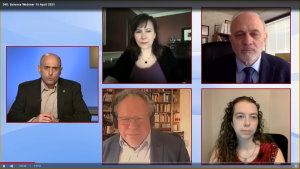 Susan Wagner, of NA USA, recommends tuning in to the 9-part (monthly), Science AAAS, Rare Diseases Webinar Series. The series expounds on many of the same hurdles we experience as NA patients, clinicians, researchers and advocates.
Susan Wagner, of NA USA, recommends tuning in to the 9-part (monthly), Science AAAS, Rare Diseases Webinar Series. The series expounds on many of the same hurdles we experience as NA patients, clinicians, researchers and advocates.
The April 15 Science webinar, "The poor diagnosis of rare diseases: Overcoming deficits in information, awareness, and understanding", was the second webinar of the 9 part Rare Disease series running in 2021.
The Webinar Overview:
“Patients with rare diseases must often wait many years for a diagnosis—a quarter of patients wait over 4 years to be diagnosed, while 50% of patients must live with no accurate diagnosis. Why is this, and can it be improved? In this installment of our Rare Diseases Series, we will discuss the broad challenges faced by the rare disease community across the world. A significant part of the problem is the lack of awareness among the medical and scientific community, but there are also obstacles put up by medical insurance companies and a broad failure in the public domain to appreciate the hurdles faced by patients with rare diseases. Being without a diagnosis can impact a patient’s physical, mental, and emotional well-being, while receiving an accurate diagnosis can allow the patient and their family to move forward with a focus on managing future challenges.”
Moderator: Shawn Sanders, PhD of Science AAAS, Washington DC
Presenters: Kym Boycott, M.D., Ph.D. University of Ottawa
Jean-Louis Mandel, M.D., Ph.D. The French Foundation for Rare Diseases
William A. Gahl, M.D., Ph.D. National Institutes of Health Bethesda, MD
Anne O’Donnell-Luria, M.D., Ph.D.Broad Institute and Boston Children's Hospital
In general, the panel invoked a sense of synergy and optimism as we move rare disease diagnoses forward. Susan noted:
- US and Europe definitions of rare disease are different. Over 200 new diseases are described every year.
- The route to diagnosis can be hampered due to insurance coverage/ healthcare systems regulations. The presenters made a strong recommendation for both doctors and patients to independently pursue University/Academia researchers, Research Centers, such as the international ‘Rare Genome Center Project’, and to utilize the power of Advocacy Groups for direction and knowledge when diagnosis becomes limited through insurance and health care systems
- All presenters agreed and described the importance of timely diagnosis of rare disease.
- With recent breakthroughs in genetic testing the ability to diagnosis rare diseases has improved dramatically.
- Genetic Counselors are NEEDED. The genetic field will continue to see increase growth in the future. A plea was made by Dr. Bill Gahl that we recommend to young science students to consider pursuing a career in Genetics.
- An international rare disease database is key for collaborating and advancing rare disease diagnosis.
Details and free registration for future webinars can be found here.